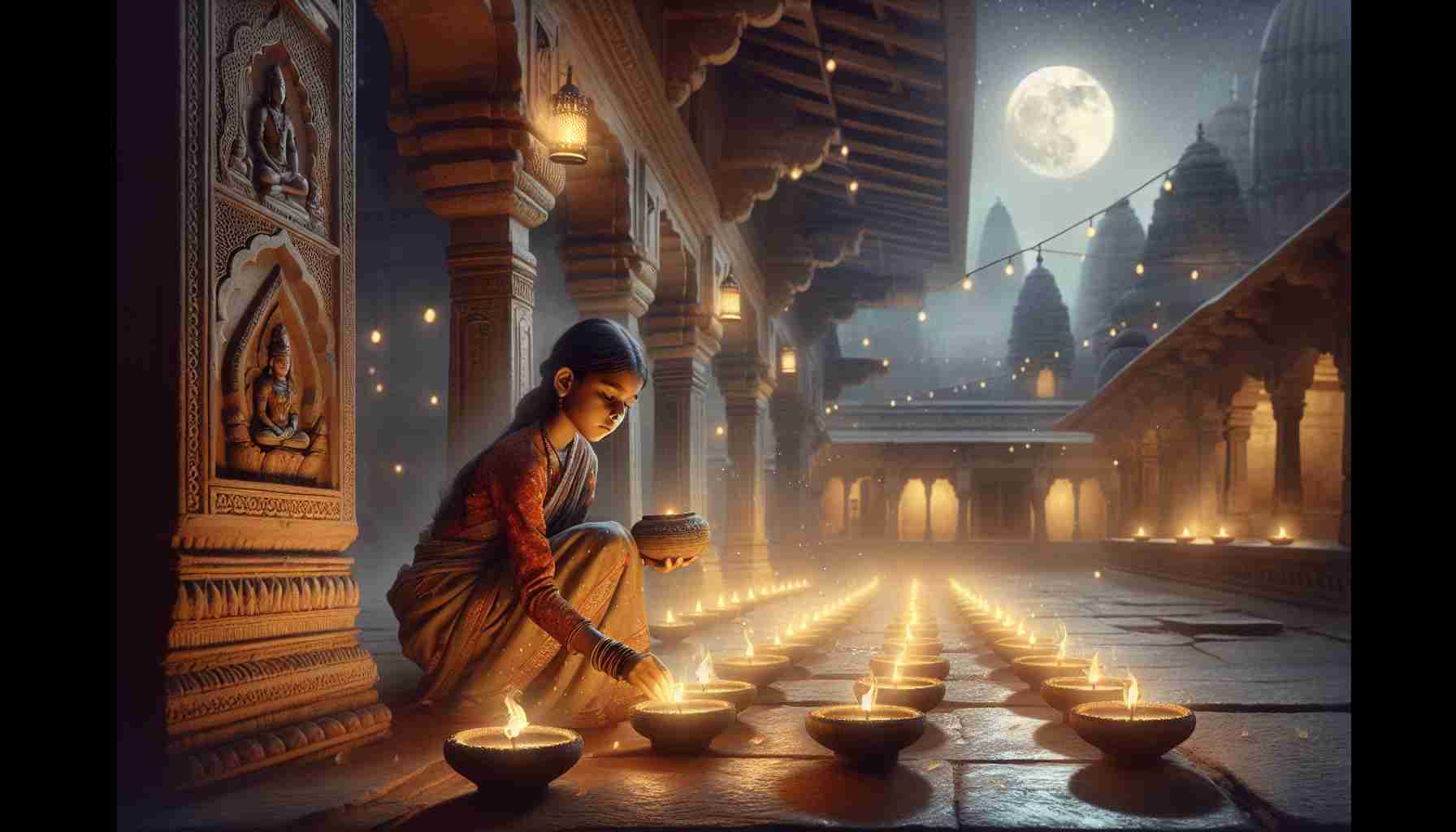

I am Pooja, daughter of village potters, born by the gentle banks of the Saraswati River in Gujarat. My family made clay lamps for the temple festival every Kartik. We were simple people, busy with our hands and prayers.
But when my parents died in a cart accident two monsoons ago, everything in me broke like a dropped lamp. I remember watching their funeral pyre, the smoke curling into the clouds, and thinking, “Even the gods don’t see me now.”
I moved to my uncle’s house in Surat—a city that buzzed with voices but held no room for grief. I slept on a thin mat in their hallway. No one was cruel, but I was unseen, like a shadow passing through.
One night, during Diwali, I wandered to the local temple alone. Bells rang, children laughed, and women lit rows of diyas—small oil lamps—at the temples' edge. I stood at the back, folded my hands, and asked in silence, “Are You still here? Or was my family Your final whisper?”
Tears welled up, hot and useless. As I turned to leave, an old woman touched my elbow. She was tiny, wrapped in a faded red sari, with white hair in a long braid.
She said nothing.
Just reached into her cloth bag and offered me a diya—clay, hand-painted, with warm sesame oil and a cotton wick.
Without thinking, I took it.
I lit it and placed it beside the others, the flame catching, dancing in the soft wind. In that quiet moment, I remembered a verse from the Bhagavad Gita my mother used to chant softly while shaping wet clay at dawn: "I am seated in the heart of all living beings." (Gita 15.15)
The words returned like a warm woolen shawl draped over my shoulders. If the sacred lives inside each heart, then even mine—cracked and lonely—was still a home for the Divine.
I stood longer than everyone else, watching the tiny light. Somewhere, not aloud, something in me whispered, “You were not forgotten. You are not.”
I walked back to my uncle’s flat that night feeling different, though nothing had changed outside. The hallway was still narrow. The sleeping mat still thin. But I’d carried a light back in with me.
In the weeks after, I kept the old diya under my bed. Each morning I’d touch it, whispering a sloka—“Lead me from darkness to light” (Brihadaranyaka Upanishad 1.3.28).
The Mahabharata tells how even Draupadi, in her darkest hour, cried out in despair, thinking Krishna had abandoned her. But help came—not with noise, but in a quiet, sacred thread.
Now I understand.
Sacred presence does not always shout above loneliness. Sometimes, it enters as a soft flame in your lowest hour.
Sometimes, it comes with no words, in the hands of a stranger.
And sometimes, it is already seated quietly, within your heart, just waiting to be remembered.
I am Pooja, daughter of village potters, born by the gentle banks of the Saraswati River in Gujarat. My family made clay lamps for the temple festival every Kartik. We were simple people, busy with our hands and prayers.
But when my parents died in a cart accident two monsoons ago, everything in me broke like a dropped lamp. I remember watching their funeral pyre, the smoke curling into the clouds, and thinking, “Even the gods don’t see me now.”
I moved to my uncle’s house in Surat—a city that buzzed with voices but held no room for grief. I slept on a thin mat in their hallway. No one was cruel, but I was unseen, like a shadow passing through.
One night, during Diwali, I wandered to the local temple alone. Bells rang, children laughed, and women lit rows of diyas—small oil lamps—at the temples' edge. I stood at the back, folded my hands, and asked in silence, “Are You still here? Or was my family Your final whisper?”
Tears welled up, hot and useless. As I turned to leave, an old woman touched my elbow. She was tiny, wrapped in a faded red sari, with white hair in a long braid.
She said nothing.
Just reached into her cloth bag and offered me a diya—clay, hand-painted, with warm sesame oil and a cotton wick.
Without thinking, I took it.
I lit it and placed it beside the others, the flame catching, dancing in the soft wind. In that quiet moment, I remembered a verse from the Bhagavad Gita my mother used to chant softly while shaping wet clay at dawn: "I am seated in the heart of all living beings." (Gita 15.15)
The words returned like a warm woolen shawl draped over my shoulders. If the sacred lives inside each heart, then even mine—cracked and lonely—was still a home for the Divine.
I stood longer than everyone else, watching the tiny light. Somewhere, not aloud, something in me whispered, “You were not forgotten. You are not.”
I walked back to my uncle’s flat that night feeling different, though nothing had changed outside. The hallway was still narrow. The sleeping mat still thin. But I’d carried a light back in with me.
In the weeks after, I kept the old diya under my bed. Each morning I’d touch it, whispering a sloka—“Lead me from darkness to light” (Brihadaranyaka Upanishad 1.3.28).
The Mahabharata tells how even Draupadi, in her darkest hour, cried out in despair, thinking Krishna had abandoned her. But help came—not with noise, but in a quiet, sacred thread.
Now I understand.
Sacred presence does not always shout above loneliness. Sometimes, it enters as a soft flame in your lowest hour.
Sometimes, it comes with no words, in the hands of a stranger.
And sometimes, it is already seated quietly, within your heart, just waiting to be remembered.